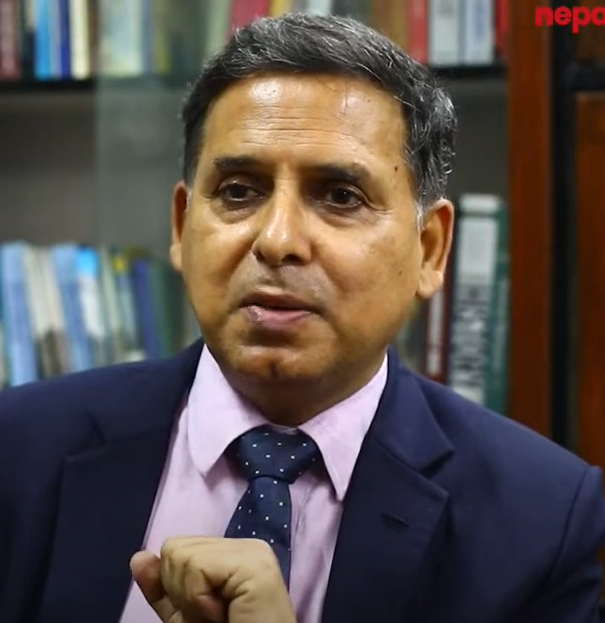At a time when the world is fighting the deadly Coronavirus, which has claimed more than 100,000 lives, legal eagles and academicians in India and abroad have underscored the need of enacting a fresh legislation to enable prevention of the spread of dangerous epidemics. This situation demands the enactment of a fresh and efficient legislation to deal with epidemic response. In this context, Jivesh Jha for Lokaantar caught up with Dr Bipin Adhikari, Constitutional Law Expert and founding Dean of Kathmandu University School of Law, this week to discuss whether the existing laws in Nepal are adequate in addressing the existing circumstances. Excerpts:
How do you see the laws governing pandemic response in Nepal?
See, we do not have modern policies, laws and institutions to address pandemic or health emergency. The legal response to health emergencies, like the outbreak of a pandemic, has been poor. We do not have a comprehensive law that deals with all aspects of prevention and control of a pandemic in the first place. The most important issue in such emergencies is to enable the federal agency to work with all provincial and local hospitals and health posts under federal coordination, resources and external support. Management of public health crisis (i.e., Coronavirus outbreak) of this magnitude is impossible without cooperation and coordination among the units of the governance. We have a plethora of peripheral laws that may be helpful in dealing with epidemics but an integrated comprehensive legislation is already due.
Do you think Infectious Disease Act, enacted by King Mahendra, a fair legislation to deal with Coronavirus outbreak?
Well, this law seems to be a very basic statute. It only has a skeleton that was okay at the time it was promulgated. In modern context, we are not only talking about plague, cholera, malaria or the likes. Highly lethal viruses have shaken the world. Our society has changed a lot. We have become part of a highly interconnected world. In fact, the spread of infectious diseases has emerged as a significant challenge to global security. Existing laws will have to take not only the challenges of educating people about the disease in order to prevent it from spreading out but also to ensure medical response in a crisis situation, disease surveillance, national planning, border restrictions, and physical distancing. The law must also provide for continuity of essential services and provision of social support.
You can see how our three tier governmental machineries are struggling to provide food to poor and marginalized sections of our communities. All these nuances must be adequately addressed by the law. We need to go beyond traditional parameters. To put it simply, we are in dire need of a comprehensive legislation showing a clear roadmap to deal with unprecedented outbreaks.
Do you think a fresh enactment is necessary?
Absolutely! We have gained certain experience by now. But many other countries have been struggling to contain the COVID-19 even with great efforts. Their experience will also be as important as ours. All the main organizations responsible for addressing public health crisis must be integrated to deal with infectious diseases. Our experience shows that there is a need for a lead federal agency to plan for preparedness of a human influenza pandemic. The components of national health services, which are responsible for the diagnosis and treatment of individuals with infectious diseases, should act uniformly and in close coordination with a federal agency during the crisis. Local authorities may also be handed statutory obligations and powers to control the spread of infectious diseases under the law.
Why has our government been highly criticized in its handling of COVID–19?
See, we are a country with limited capacity and resources. We are fighting a global challenge which has become an uphill task for every democracy, autocracy or monarchy. And, keep in mind that almost all the governments in the world facing the pandemic have been criticized for their inefficiencies and lapses. How could Nepal be immune from criticism? We can be critical. But we should avoid being cynical. The government needs the support from all quarters. It should be encouraged to develop a clear and coherent legislative and regulatory framework for an effective public health crisis system.
Do we have constitutional challenges regarding this issue?
Obviously, we have constitutional challenges as well. ‘Lockdown’ is a major constitutional issue. It was desperately needed, but it is not something that you can do arbitrarily. The state has to live with certain responsibilities and legal limits to power. Additionally, the constitution guarantees the right to health as a fundamental right. Importantly, our constitution guarantees right to food and housing of every citizen. These rights are in peril because of the health emergency. We do not have crisis preparedness. If we take a pledge to work on a new legislation, probably we will get the opportunity to work on everything new including health insurance.
[Published on 14 April 2020]

